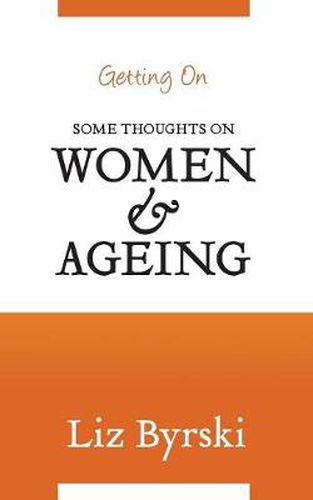Readings Newsletter
Become a Readings Member to make your shopping experience even easier.
Sign in or sign up for free!






This title is printed to order. This book may have been self-published. If so, we cannot guarantee the quality of the content. In the main most books will have gone through the editing process however some may not. We therefore suggest that you be aware of this before ordering this book. If in doubt check either the author or publisher’s details as we are unable to accept any returns unless they are faulty. Please contact us if you have any questions.
Why are we so obsessed with staying young?
In a culture that advocates the pursuit of endless youth and physical beauty how can we embrace the reality, the pleasures and the rewards of getting on? And what does the ‘fight against ageing’ mean when all women must eventually face the double-standard of ageism and sexism?
Once past fifty, older women begin to sense that they have become invisible. From the visual displays in the mall to the pages of magazines and the television screens at the heart of our homes, young women with perfect skin, bouncy, enhanced breasts, pouting lips, long straight hair and perfect teeth gaze down on us.
The ageing population is traditionally viewed as a problem; a drain on financial resources, health, housing and community services and a burden on younger generations. But living longer and living well are the triumphs of a civilised society. It is also the future that all generations want for themselves.
Can we change the conversation on ageing? Getting old is tough, but it’s also an opportunity to celebrate how far we have come and to shape a different future. In this essay, Liz Byrski (author of Last Chance Cafe and Bad Behaviour) examines the adventure of growing old in the twenty-first century: the new possibilities, the joy and the sorrow of solitude, the reality of grief and loss and the satisfaction of having travelled so far.
Writers like Byrski are needed not only for the clarity of their emotional intelligence but for the courage of their political convictions. West Australian
$9.00 standard shipping within Australia
FREE standard shipping within Australia for orders over $100.00
Express & International shipping calculated at checkout
This title is printed to order. This book may have been self-published. If so, we cannot guarantee the quality of the content. In the main most books will have gone through the editing process however some may not. We therefore suggest that you be aware of this before ordering this book. If in doubt check either the author or publisher’s details as we are unable to accept any returns unless they are faulty. Please contact us if you have any questions.
Why are we so obsessed with staying young?
In a culture that advocates the pursuit of endless youth and physical beauty how can we embrace the reality, the pleasures and the rewards of getting on? And what does the ‘fight against ageing’ mean when all women must eventually face the double-standard of ageism and sexism?
Once past fifty, older women begin to sense that they have become invisible. From the visual displays in the mall to the pages of magazines and the television screens at the heart of our homes, young women with perfect skin, bouncy, enhanced breasts, pouting lips, long straight hair and perfect teeth gaze down on us.
The ageing population is traditionally viewed as a problem; a drain on financial resources, health, housing and community services and a burden on younger generations. But living longer and living well are the triumphs of a civilised society. It is also the future that all generations want for themselves.
Can we change the conversation on ageing? Getting old is tough, but it’s also an opportunity to celebrate how far we have come and to shape a different future. In this essay, Liz Byrski (author of Last Chance Cafe and Bad Behaviour) examines the adventure of growing old in the twenty-first century: the new possibilities, the joy and the sorrow of solitude, the reality of grief and loss and the satisfaction of having travelled so far.
Writers like Byrski are needed not only for the clarity of their emotional intelligence but for the courage of their political convictions. West Australian